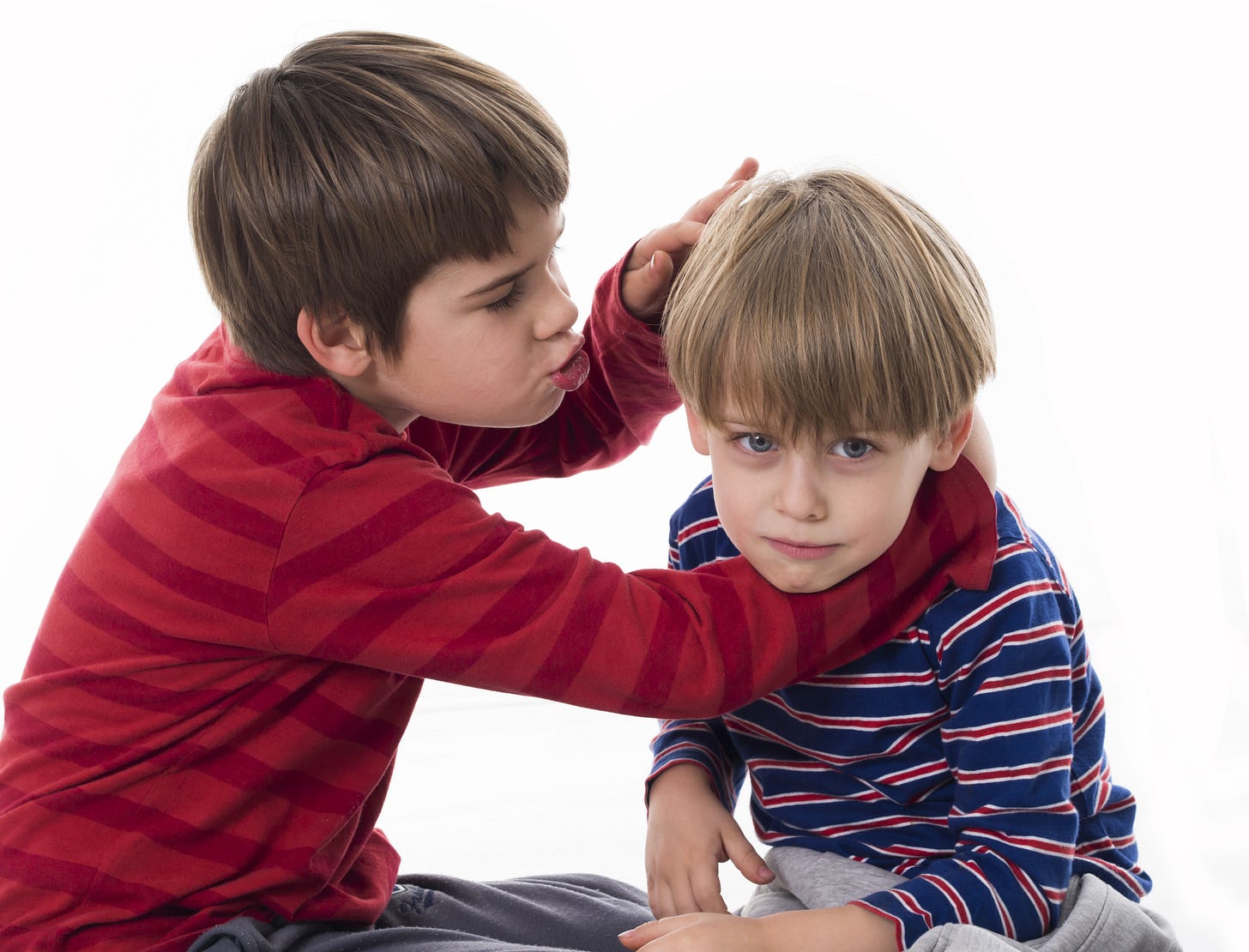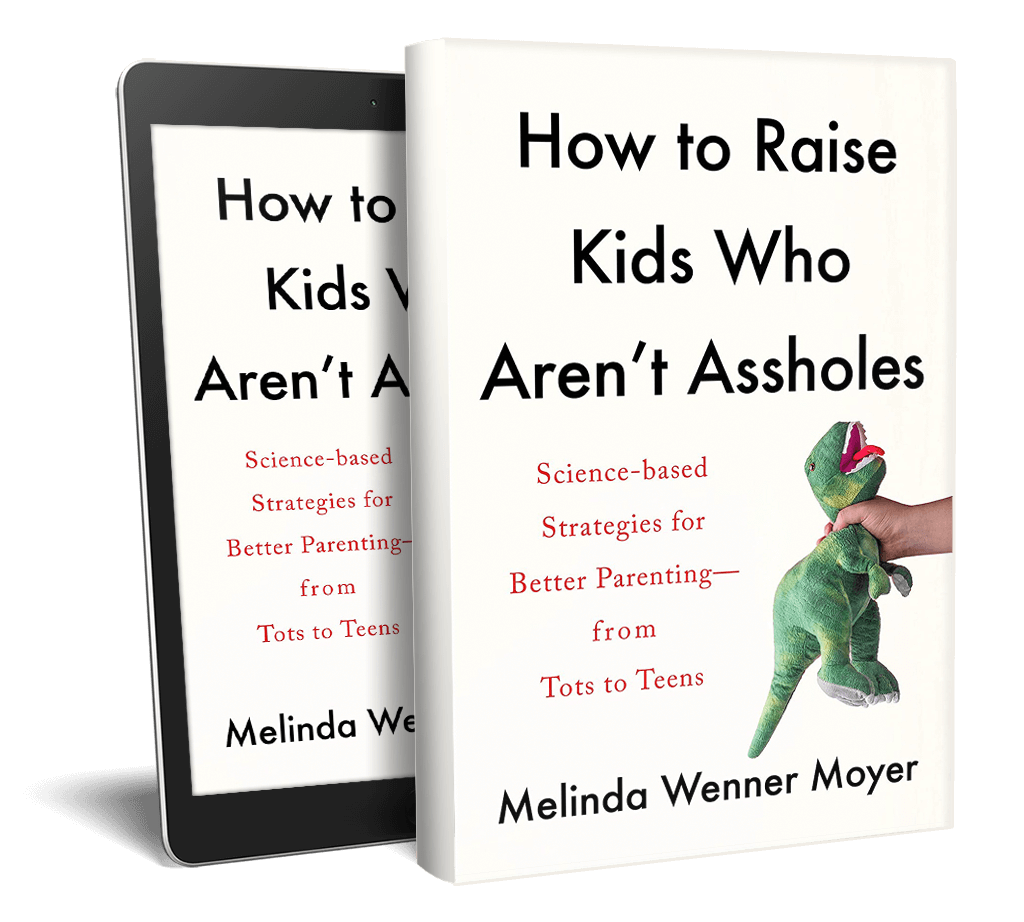How to Help Kids Navigate Friendship
What you should — and shouldn't — do when you're worried about your kids' friends.
Welcome to Is My Kid the Asshole?, a newsletter from science journalist and author Melinda Wenner Moyer, which you can read more about here. If you like it, please subscribe and/or share this post with someone else who would too.
Dear Is My Kid the Asshole?,
My son has a friend I don’t particularly like. He’s loud, obnoxious and always getting into trouble. I’m worried he’s a bad influence. He also says mean things to my son and makes him cry sometimes. What can I do to steer my kid away from him?
Sincerely,
The Reluctant Meddler
Dear Reluctant Meddler,
It’s so unfair, isn’t it? We do everything we can to protect our kids from bad things, and then as soon as they’re old enough to make their own decisions, what do they do? They embrace bad things.
Or things we think are bad, anyway. Almost certainly, your kid sees something in his friend that you don’t; he may well get something useful or even wonderful out of their relationship. You may not think much of this child right now, but it doesn’t mean they have no redeeming qualities.
So what should you do? Should you encourage your child to stop hanging out with the friend, or should you stay out of it? What if you’re worried that the friend is exposing your kid to alcohol or drugs? Then is it OK to ban the friendship?
This is a complicated topic, so I decided to reach out to three experts. They all pretty much said the same thing. “If you think you can cherry-pick your child's friends, you're misguided,” said psychologist Michael G. Thompson, author of the book Best Friends, Worst Enemies: Understanding the Social Lives of Children.
For one thing, if you tell your child they can’t hang out with their friend, they’re probably not going to listen. You’re setting them up to fail, and then you’ll have to deal with the defiant consequences. Kids do not want to be controlled, especially when it comes to who they hang out with. In the realm of friendship, we need to “step away from our expectations and let our kids start to lead,” said child and adolescent psychotherapist Katie Hurley, the author of No More Mean Girls.
Keep in mind, too, that kids can have different kinds of friends, for different kinds of reasons, said psychologist Eileen Kennedy-Moore, the author of Growing Friendships. Your child might be exploring what it’s like to get to know someone different from them. Or maybe the friendship has blossomed as a byproduct of convenience, because the kids sit next to each other in class or are on the same bus. Maybe this friend incites excitement or intrigue. Kids are curious, and friendships can be driven by curiosity, too.
Friendships in childhood are often fleeting as well — so even if two kids are besties today, they might not give each other the time of day next month. One study found, for instance, that first graders kept only about half of their friendships over the course of a school year. Adolescents are even more mercurial: When researchers followed seventh graders’ new friendships, they found that fewer than a quarter continued into the eighth grade, and fewer than one-tenth remained in the ninth grade. So that friend you don’t like may be out of your child’s life before you know it, without you having to do anything about it at all.
Still, just let things be is not particularly satisfying advice, I know. So here are some expert-backed strategies to help you support your child (and retain your sanity) if you’re concerned.
Try to understand what your child likes about their friend.
To learn more about their friendship, ask your child open-ended questions. “One thing I always encourage parents to do is to say to their kids, ‘Tell me, what you love about that friend?’” Hurley said. “Meeting our kids with curiosity keeps us out of the judgment zone, which is important.” Once you know what your child likes about the other kid, you might be able to put the unlikeable parts into perspective.
You can ask other, more thought-provoking questions, too: What do you admire about your friend? What does she do to show you that she cares about you? How do you usually feel when you’re hanging out with her? If you want to talk about friendship more generally, without zeroing in on this particular friend, you could say: What do you think are the qualities of a good friend? Questions like these can help prompt kids to think about the benefits and drawbacks of their relationships.
Consider, too, that your assumptions about the supposedly evil friend might not be spot-on. Be careful about “assuming that whatever bad behavior is happening, is happening entirely because of the other kid,” Kennedy-Moore said. “It's highly likely that the other child isn't a complete devil, any more than your kid is always a perfect angel.”
Even if you’re not concerned about a particular friend, check in with your kid regularly about their friendships, Hurley suggested. You might say Hey, what’s going on with your friends at school this week? Anything funny happen? Anything not so funny happen?
Offer to host the friend in your home.
Even if you don’t love your kid’s friend, it can still be smart to invite them over. You’re showing your child what it is to be a welcoming and gracious person, and when the kids are in your house, you can also keep an eye on them, Kennedy-Moore said. If you catch them doing questionable things, don’t pass judgment or yell, but simply share your house rules and expectations. Sorry, we don’t allow pretzels in noses here or Our house rule is that we don’t use the dog as a football. Afterwards, you can also follow up with your child about any illicit goings-on. Last time Jax came over, you two tried to light my slippers on fire. What can we do to make sure that doesn’t happen next time?
There’s nothing wrong with brainstorming ways to engage your child with other kids, too, Kennedy-Moore said. “Get your kid involved with another activity, or encourage playdates with others,” she said. “Let your child see the contrast of playing with different people.”
If the friend hurts your child’s feelings, empathize before you problem-solve.
If your kid comes home crying because their friend said or did something mean, the first thing to do is show compassion. Oh, I’m sorry to hear this. You must be upset, or This is your really good friend. But it sounds like she's doing some things that aren't that nice. Mirror back what they’re saying or what you’re seeing. When you show empathy, you’re essentially telling your child, “I'm here, I'm going to help you through this,” Hurley said.
Often, as parents, we jump in too quickly with insults or solutions. We’ll say What a jerk! about the friend, or Next time, you should tell him that’s not very sportsmanlike. But we shouldn’t start to give advice until after we’ve offered some empathy. “When you see the softening in your kid's face and body, or you get that grunt of acknowledgment, then, and only then, you can shift to problem-solving,” Kennedy-Moore said. At that point, you may want to outright ask if they want advice, because sometimes they don’t, and that’s OK. You could say something like How can I best help you? Do you want only support right now, or do you also want solutions?
If they do want your help, lead with more questions. “A good way to start that conversation is to say, ‘Well, what's the outcome you want? Do you want to mend this friendship? Do you need some breathing room from this friendship? Do you want to walk away right now and take a break?’” Hurley explained. (If they do want a break, make sure they don’t ghost their friend; they should instead communicate that they need some space, Hurley said.)
Kennedy-Moore sometimes plays what she calls “The Maybe Game” with kids who feel slighted by a friend. If, say, the friend didn’t reply to a text message, she’ll ask the child to list all the possible reasons why they didn’t reply. Sure, maybe she did this to hurt you. But what are some other possible reasons? Doing this helps kids build perspective and makes it harder for them to catastrophize.
If you’re worried your kid could end up in a bad situation, build trust and provide escape plans.
Try as we may, there’s no way to guarantee that our kids will never end up in potentially dangerous or compromising situations. But we can have conversations with them to help them understand their options, and to communicate that we will always be there to help.
How might a conversation like this go? Hurley suggested saying something like, Hey, just so you know, you can come to me with anything at any time, and I will help you. Let’s say you are hanging out with friends, and they're offering you alcohol and you're not sure what to do. No judgment — you can call me or send me a text and I’ll come get you. I'm not going to come down on you, I'm not going to punish you. I’m going to help. It’s important to communicate that you’ll come to their aid without negative consequences. “If we start handing out consequences for every single thing, they lie, they shut down, they sneak around — they just learn how to be secretive,” Hurley said.
Also, be sure to talk about drugs and alcohol with your child. (For more on how and why to do that, see my Q&A from this summer with Jess Lahey.) Hurley said that teens often ask her questions about alcohol and drugs — they are hungry for information because parents are often afraid to talk about it. “They're looking for education. And if you don't give it to them, they're going to get it on Tik Tok, which is not going to be great,” Hurley said. Also, regularly highlight your family’s values and expectations. What do you expect your kids to do in difficult situations? We often assume our kids instinctively know what we want them to do, but in reality, they often don’t. We need to spell it out.
One other tip, if you’re worried your kid might be making bad choices: Remind them of their goals, and how bad choices might interfere with them, Hurley suggested. If your kid’s dream is to be a professional basketball player, say, OK, well, how does vaping in the bathroom help you achieve that? This can ground them and help them make better choices — even if their friends end up going down a different path.
Tonight (Tuesday) I’ll be talking about my book on Facebook Live with author Adriana Trigiani. I should be on at around 7:25 ET. Join by clicking here!
I’m thrilled to be this week’s guest on The Puberty Podcast with Cara Natterson and Vanessa Kroll Bennett. We had so much fun. You can listen to it here.
Thursday evening I’m doing a free live Zoom discussing my book with the Science Writers of New York. Register here!





